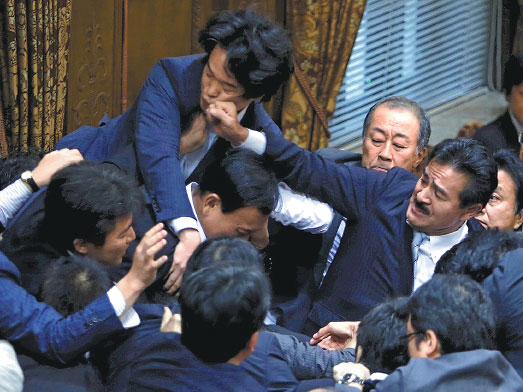Security bills move closer to becoming law
A set of radical security bills was passed on Thursday by a special committee under the Japanese upper house, aimed at enabling more military operations to be staged overseas.
The bills were approved amid protests across the country and criticism from outside Japan.
The ruling Liberal Democratic Party and its coalition partner the Komeito party put the bills to a vote despite mounting protests from the opposition camp.
Led by Prime Minister Shinzo Abe, the ruling coalition has a majority in both the upper and lower houses. This means the controversial bills could be approved at a plenary session of the upper house on Friday at the earliest.
If enacted, the bills will allow the Japanese Self-Defense Forces to engage in armed conflicts overseas, even if Japan is not under attack, for the first time in 70 years. However, the Japanese Constitution, which renounces war, bans the SDF from using forces abroad.
Motofumi Asai, a former Japanese diplomat and former president of the Hiroshima Peace Institute, said, "The security-related bills, which are unconstitutional, are actually war legislation.
"Abe's political mission is to build Japan into a big military power and turn it into a link in the United States' operations", Asai said. "Japanese politicians, including Abe, are defying public opinion that opposes the bills."
Asai hopes public outrage will have an impact on the upper house election next year and lead to a change of government at the next general election, which is not due until 2018. Then, the new government could declare the bills null and void because the right to collective self-defense goes against Article 9 of the Japanese Constitution, Asai said.
A Mainichi Shimbun editorial said the protests against the bills highlight the fear that Japan's accomplishments over the years as a peaceful nation will be sabotaged.
"The administration is giving the utmost priority to military demands based on Cold War thinking," it said, criticizing the bills for maximizing the range of activities Japan's Self-Defense Forces are allowed to carry out.
Liu Jiangyong, deputy dean at the Institute of Modern International Relations at Tsinghua University, said the Japanese ruling coalition's majority in the upper and lower houses has "facilitated a fearless campaign by the ruling parties to get the security bills passed".
"The Liberal Democratic Party is not listening to any complaints from the voters," Liu added.
Feng Wei, a professor of Japanese studies at Fudan University in Shanghai, said the main aim of the security bills is to end restrictions on exercising the right to collective self-defense, adding that the impact on China could not be ignored.
A poll by Asahi Shimbun, a major Japanese daily, showed that support for Abe's Cabinet has fallen to about 36 percent, the lowest level since he returned to power in late 2012. The disapproval rate for the Cabinet remained at about 42 percent.
Xinhua contributed to this story.
Contact the writers at caihong@chinadaily.com.cn
|
Masahisa Sato (right) from Japan's ruling Liberal Democratic Party hits out at opposition lawmaker Hiroyuki Konishi (top) during a vote at an upper house special committee session on security-related legislation in Tokyo on Thursday. Yuya Shino / Reuters |



















